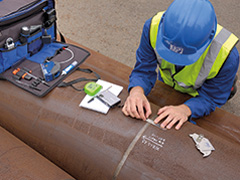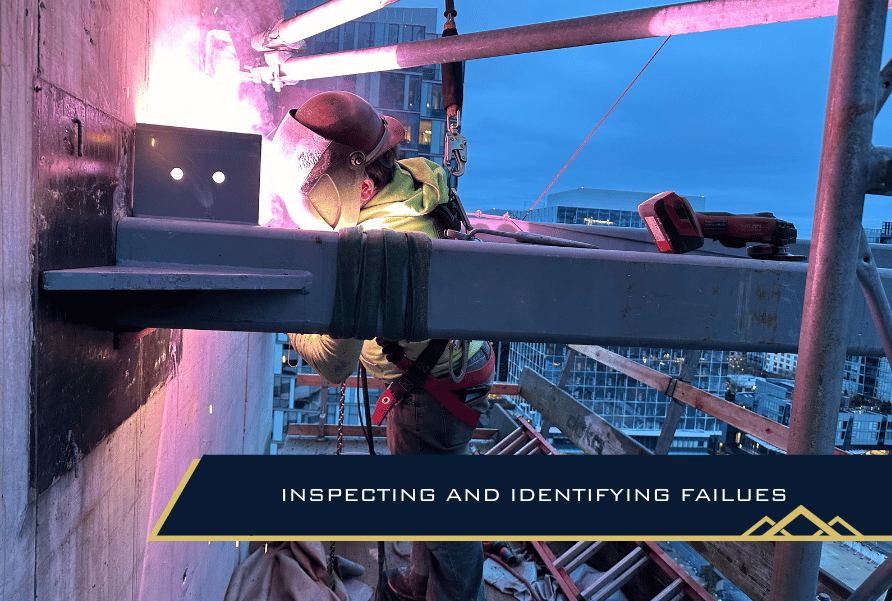The Impact of Strenuous Welding Examination on Industry Requirements: Promoting Safety And Security, Dependability, and Conformity Across Various Sectors
The duty of strenuous welding examination is significantly identified as a crucial element in enhancing industry criteria, where conformity, dependability, and safety and security take priority across diverse fields. What makeovers might we prepare for in welding approaches as the demand for high quality and safety magnifies?
Importance of Welding Inspections
Identifying the vital role of welding examinations in preserving top quality and security standards, industry specialists prioritize these analyses to ensure architectural stability. Welding examinations function as a vital checkpoint in the fabrication process, determining defects that can jeopardize the resilience and safety of bonded frameworks. By methodically analyzing welds, assessors can identify problems such as insufficient infiltration, porosity, and cracks, which may not be noticeable to the nude eye.
The significance of these assessments extends beyond simple conformity; they are essential for protecting lives and shielding investments. In crucial markets such as building, production, and aerospace, a solitary defective weld can lead to tragic failures, resulting in both monetary loss and human casualties. Applying rigorous assessment methods minimizes these dangers and enhances total task integrity.
In addition, regular welding examinations cultivate a society of top quality throughout companies, urging welders to comply with best practices and keep high requirements in their work. This dedication to top quality not only improves functional effectiveness however additionally reinforces the credibility of business within their particular sectors. Hence, welding evaluations are essential in advertising safety, integrity, and conformity throughout various sectors.
Secret Industry Criteria and Laws
The structure of welding assessments is underpinned by a robust set of sector requirements and regulations that regulate practices across numerous industries. Trick establishments, such as the American Welding Culture (AWS) and the International Organization for Standardization (ISO), establish guidelines that ensure quality and safety and security in welding procedures. AWS D1.1 lays out important demands for welding steel frameworks, while ISO 3834 defines quality demands for combination welding.
Along with these certain criteria, sector regulations like the American National Criteria Institute (ANSI) and Occupational Security and Health And Wellness Administration (OSHA) mandates further enhance compliance by setting safety protocols and operational best practices. These regulations are critical in industries such as production, aerospace, and construction, where welding stability is vital.
In addition, sector-specific standards, such as those from the American Society of Mechanical Engineers (ASME) for pressure vessels, provide additional layers of scrutiny to ensure that welds fulfill stringent security and efficiency criteria. Adherence to these standards not just facilitates regulative compliance but additionally promotes a society of high quality and reliability throughout the welding industry, inevitably protecting public welfare and improving operational performance.

Benefits of Conformity and Dependability
Consistently sticking to industry criteria and policies in welding examinations yields substantial advantages, enhancing total integrity and efficiency. The primary advantage is the assurance of top quality in welded joints, which directly adds to the security of her latest blog frameworks and equipment. Conformity with recognized standards reduces the threat of failure and disastrous incidents, consequently shielding both human life and valuable possessions.
Moreover, organizations that focus on strenuous welding evaluations promote a society of accountability and professionalism. This commitment not just bolsters the track record of the company however also infuses confidence in clients and stakeholders concerning the integrity of product or services. Reputable welding processes lead to minimized prices linked with rework, repair work, and prospective lawful responsibilities stemming from poor workmanship.
Furthermore, preserving compliance with industry standards helps with smoother regulative interactions, as organizations can easily demonstrate adherence to needed procedures (Welding Inspection Gilbert Arizona). This positive method can cause useful collaborations and possibilities within the industry, as well as access to new markets
Difficulties in Welding Examination
Navigating the intricacies of welding inspection presents a myriad of challenges that can impede compliance with market standards. The lack of standard training for examiners can result in diverse analyses of evaluation standards, which may endanger safety and dependability.
An additional challenge depends on the availability of innovative evaluation devices - Welding Inspection Gilbert Get More Information Arizona. While technologies such as ultrasonic screening and radiography can enhance discovery abilities, their implementation may be restricted by price or schedule, particularly in smaller operations. This variation can cause a dependence on less reliable inspection approaches, increasing the risk of unnoticed flaws
In addition, the hectic nature of contemporary manufacturing typically stress examiners to prioritize rate over thoroughness, possibly forgeting important issues. Governing conformity can be intimidating due to the progressing nature of market requirements, leaving organizations having a hard time to keep up with the latest requirements. These difficulties require constant renovation in inspection practices to make sure the honesty of bonded structures across numerous sectors.
Future Trends in Welding Practices
Arising modern technologies and progressing techniques are readied to change welding techniques in the coming years. Improvements in automation, such as robot welding systems, are obtaining traction, enhancing precision and effectiveness while reducing human error. These systems will certainly not only speed up manufacturing however additionally help with regular quality assurance, addressing several of the difficulties faced in hand-operated welding.
Furthermore, the assimilation of expert system (AI) and artificial intelligence into welding procedures is poised to change evaluation and monitoring. Full Article Real-time information analytics will make it possible for predictive upkeep, permitting proactive treatments that minimize downtime and boost safety. In addition, enhanced fact (AR) and virtual truth (VR) innovations are becoming critical in training welders, giving immersive experiences that enhance ability growth without the dangers related to conventional approaches.
Sustainability is also an essential pattern, as markets look for greener techniques. The adoption of green materials and methods, together with energy-efficient equipment, will likely come to be conventional. As sectors adjust to these adjustments, the emphasis will change towards greater compliance with security and environmental guidelines, making certain that welding methods not only satisfy present criteria yet additionally pave the way for a safer and more sustainable future.

Conclusion
In verdict, strenuous welding examinations dramatically improve market requirements by making sure security, reliability, and conformity throughout different fields. As markets proceed to focus on operational stability, the importance of extensive assessments will only raise, inevitably profiting services and society at big.
The role of extensive welding evaluation is significantly acknowledged as a vital component in enhancing sector criteria, where dependability, security, and conformity take priority throughout diverse fields. Hence, welding evaluations are indispensable in promoting safety and security, reliability, and compliance throughout numerous markets.
Key establishments, such as the American Welding Society (AWS) and the International Company for Standardization (ISO), establish standards that ensure top quality and security in welding operations. AWS D1.1 describes necessary needs for welding steel structures, while ISO 3834 defines high quality requirements for fusion welding.
In final thought, strenuous welding evaluations considerably boost market standards by making sure security, dependability, and compliance throughout various sectors.
Comments on “Optimize Your Welding High Quality with Expert Inspection Services in Gilbert Arizona”